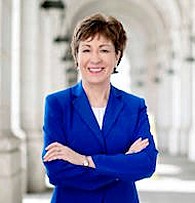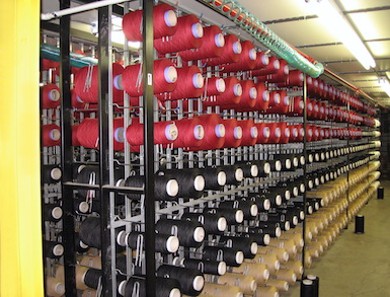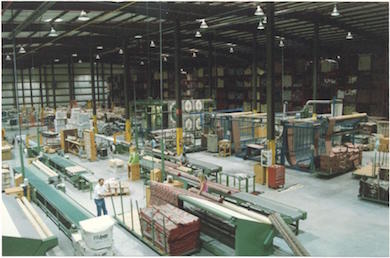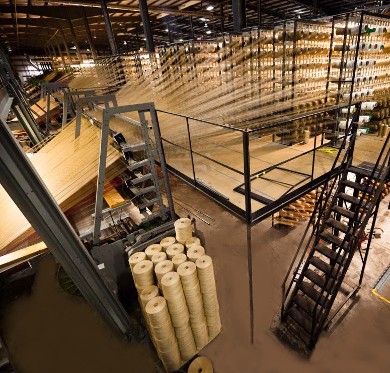MAINE POLITICIANS STEP IN TO SUPPORT NATCO'S FLEMISH MASTER WEAVERS
 |
"Approval would not only increase competitiveness, but set the company on track to expand operations." -- Susan Collins, U.S. Senator, Maine
|
|
WASHINGTON, D.C. -- Flemish Master Weavers, a Maine manufacturer of machine-woven area rugs, has lined up the support of federal and state politicians to weigh in on the company's efforts to receive an exemption for certain textile tariffs. The exemption could save the company half a million dollars to $1 million annually, Johan Moulin, Flemish Master Weaver president, told RugNews.com, adding that the savings would allow the company to expand its operations.
However, the move by Flemish Master Weavers, which houses Central Oriental under its umbrella and is a division of Rhode Island-based Natco Home, has some players in the U.S. textiles industry up in arms.
Stepping into the fray are Maine lawmakers worried about the potential consequences that the denial of Flemish's request would have on local employment. In fact, U.S. Sens. Susan Collins and Angus King, and U.S. Reps Chellie Pingree and Bruce Poliquin announced that they sent a letter to the Foreign-Trade Zone (FTZ) Board in support of Flemish's trade appeal.
Flemish Master Weavers is part of the state's Waterville FTZ 186, which covers six counties. FTZs, similar to the duty-free shops at the airports, allow an earmarked region within the U.S. to avoid, reduce or defer paying duties on imported goods.
"We decided to do this to solve a problem we see as unfair competition from imports," Moulin said. "If you are bringing finished area rugs into the U.S. you pay no tariffs, but the duty is about eight percent on all the yarn we purchase from overseas."

Maine-based Flemish Master Weavers is seeking an exemption on the duty it pays for the polypropylene and polyester yarns imported from overseas to make its area rugs.
DOMESTIC WOES
Flemish Master Weavers appears to be stuck in the middle of a major crossroad in the U.S. textile business. Most manufacturers of area rugs made in the U.S. are vertically integrated and produce their own fibers and/or yarns, so they don't have to pay taxes on the yarn used to manufacture their finished product. And, American sources of the polypropylene Flemish Master Weavers uses in its production would be prohibitively expensive, Moulin said, noting that there are no viable domestic sources. Instead the company goes overseas to purchase its yarn and pays a duty.
Three trade groups, the American Fiber Manufacturers Association, the National Council of Textile Organizations and the U.S. Industrial Fabrics Institute, opposed Flemish Master Weavers' petition for a waiver from the duty on imported polypropylene and polyester yarns, stating in a letter, "it would harm existing producers of the yarns and also set a damaging precedent."

Maine lawmakers said they are concerned about losing one of the state's largest manufacturers and employers in the area.
However, Maine lawmakers are concerned about losing one of the state's top employers that claims it is losing out to less expensive, imported machine-made rugs.
"A strong manufacturing industry is essential to Maine's future, and securing fair trade regulations for Maine-based companies is of critical importance to our communities and economy," stated the Maine Congressional Delegation in a letter dated Dec. 1, 2016. "Flemish Master Weavers employs 127 people in Sanford, Maine, and is one of southern Maine's largest manufacturing employers. Approval of the FTZ application would not only increase competitiveness, but set the company on a track to expand operations."
Flemish Master Weavers, equipped with 11 high-speed looms, stated that the savings would allow the company to add a 72,000 square foot expansion to its footprint, purchase two additional looms and replace four, Moulin said. Such upgrades could potentially increase employment from 127 to 170 jobs.
Tthe economic development organization Sanford Regional Council's website stated that in 2012, Flemish had expanded its facility to its current footprint of 210,000 square feet, and added an eighth loom to its operation. At that time it had approximately 100 employees. Since then, the company has added three more state-of-the-art high-speed Van De Wiele looms, the newest in August 2016, which the company said was the first of its kind.

Flemish Master Weavers, equipped with 11 high-speed looms, said it would grow its 210,000 square foot facility by 72,000 square feet and add new looms to its production, with the annual savings if the petition is accepted.
According to Sen. Collins, current textile tariffs, designed to protect American manufacturers like Flemish, are actually putting the company at a disadvantage and stifling growth. Flemish Master Weavers manufactures Central Oriental and Natco Home products.
"Despite being designed to protect U.S. businesses, that tariff is actually putting Flemish Master Weavers at a competitive disadvantage against the foreign competitors who enjoy duty-free access to the U.S. for the area rugs they manufacture abroad with identical yarn," Sen Collins stated.
Enacted into law in 1936 by the U.S. Congress, as part of the New Deal, a Foreign-Trade Zone is a designated location in the United States where companies can delay, reduce U.S. Customs duties and receive duty-free status for re-exported items. At press time, there were 250 Foreign Trade Zones, including Atlanta, Los Angeles and New York City.
"For us it's a no brainer. We really hope the FTC will approve our application," Moulin said. "We are a prime example of why the U.S. created the FTZ in the first place."
Since 2012, Flemish Master Weavers has added three state-of-the-art high-speed Van De Wiele looms, the newest coming online in August 2016, the first of its kind in the U.S..